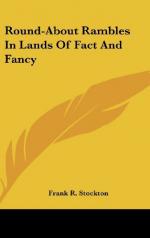After the bears, what shall we hunt? What do you say to a hippopotamus? That will be something that we are not accustomed to, at any rate. So away we go to the waters of Africa. If we travel along the shores of the Nile and other African rivers, we shall, no doubt, see some of these great creatures. But we must not expect to get a good sight of any of them, unless we are very careful to hide ourselves somewhere near where they are in the habit of coming out of the water to take a walk on land. Ordinarily all that can be seen of a hippopotamus is his head or his back, sticking up out of the water. They can stay under water for a long time, occasionally sticking up their noses to get a breath of air.
At night they often come on shore to see what they can find to eat. They live on grass and grains, which they find in the water and on land. These animals are generally shot or harpooned at night, when they come out of the water, but occasionally a hunter sees one on shore in the daytime, and he seldom finds any difficulty in shooting it, if he can hit it in the ear, which is its most vulnerable spot.
The hippopotamus is naturally a timid animal, and seldom turns on its hunters, but sometimes it shows a courageous disposition. Some hunters, having shot a young but apparently a tolerably well-grown hippopotamus, were running up to their prize, when they were astounded by the old mother beast coming up out of the water and charging towards them with tremendous roars.
[Illustration: A BRAVE HIPPOPOTAMUS.]
The hunters fired at her and then took to their heels, but having found her offspring, she stayed with it and did not pursue the men. If she had overtaken them, she would have been a terrible enemy to encounter.
If, during our night-watches on the river-banks, we are so fortunate as to shoot a hippopotamus, we shall find that we have a good supply of very fine meat And what we cannot eat the natives will be delighted to get. They consider a hippopotamus a most valuable prize, and as the meat is good and there is so very much of it, their joy when they kill one is not at all surprising. The only thing that troubles them after a successful hunt is that there are so few hippopotami killed, and so many negroes to eat them.
[Illustration: A RHINOCEROS TURNING THE TABLES.]
And now let us try a rhinoceros hunt. This animal is found in the same regions that the hippopotamus inhabits, but he also lives in Asia. He is rather a dangerous animal to hunt. He is a savage fellow when provoked; he has a great horn on his nose, and a skin so thick that it is almost bullet-proof, and, besides that, he is the largest and strongest animal on the earth, excepting the elephant. So no wonder he is a little unsafe to hunt.
The rhinoceros lives on grass and herbs, and makes his home entirely on the land. His flesh, like that of the hippopotamus, is very good to eat, but rhinoceros-beef ought to be dear, if the trouble and danger in getting it is taken into consideration when the price is fixed. He very often turns and charges on the hunters, and if he gets his horn under a man or a horse, he is likely to cause trouble.




